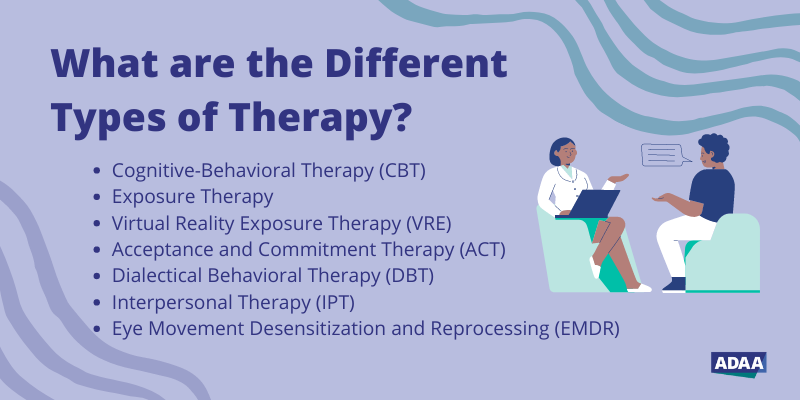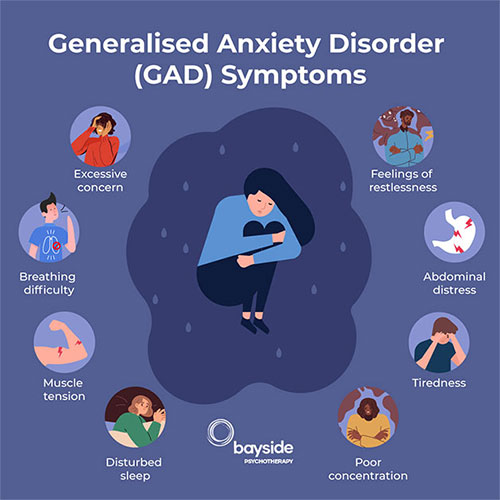Counselling for anxiety disorder: Custom sessions crafted for your well-being
Counselling for anxiety disorder: Custom sessions crafted for your well-being
Blog Article
Checking Out Various Techniques in Counselling for Anxiety Condition for Long Lasting Modification
When tackling anxiousness conditions, it's essential to explore a variety of counseling approaches. Each method offers unique insights and tools to aid you handle your signs efficiently. You could find that incorporating techniques can generate the very best outcomes. Comprehending the subtleties of these methods is crucial to promoting lasting change. Suppose the ideal combination could release a new degree of emotional health for you?
Recognizing Anxiety Problems: A Quick Introduction
Stress and anxiety problems, which impact numerous individuals worldwide, can substantially influence everyday life. You could experience frustrating sensations of anxiety or fret that appear irrepressible. These sensations can bring about physical symptoms like a racing heart, sweating, or perhaps lightheadedness. Usual kinds of anxiousness problems include generalized stress and anxiety condition, panic attack, and social anxiety condition. Each has special indications, yet they all share a tendency to disrupt your regular and relationships.Understanding the root causes of your anxiety is essential. It could stem from genetics, mind chemistry, or life experiences. Recognizing your triggers can assist you handle your responses much better. It's important to keep in mind that you're not the only one in this struggle. Lots of people deal with similar difficulties, and seeking help is a solid action towards feeling better. By discovering stress and anxiety problems, you're currently on the course to understanding and managing your condition better.
Cognitive-Behavioral Therapy: Challenging Negative Thought Patterns

Recognizing Unfavorable Idea Triggers
Acknowledging the particular triggers behind your adverse thoughts can be crucial in taking care of stress and anxiety when you come across moments of distress. Begin by paying interest to situations that prompt feelings of fear or anxiety. Is it a crowded area, an approaching deadline, or a discussion with particular people? Take down these instances in a journal. This will certainly assist you identify patterns in your reasoning. Also, notification physical experiences that accompany your negative thoughts, like an auto racing heart or tightness in your breast. By identifying these triggers, you acquire insight right into what's fueling your stress and anxiety. Understanding these connections is the primary step in challenging those thoughts and eventually regaining control over your emotional reactions.

Replacing Thoughts With Positives
Challenging negative idea patterns is a vital action in changing your way of thinking and lowering stress and anxiety. You might frequently locate on your own entraped in cycles of self-doubt or disastrous thinking. As opposed to letting these thoughts dictate your feelings, method replacing them with positive affirmations or sensible options. When you assume, "I can not handle this," change it to, "I can manage difficulties one action at a time." This simple change can considerably impact your emotional state. Frequently determining and countering these unfavorable thoughts aids develop a much healthier interior discussion. Keep in mind, it requires time and initiative, however continually exercising this strategy can bring about lasting adjustment, equipping you to deal with stress and anxiety with renewed confidence and resilience
Structure Coping Methods With Each Other
Replacing unfavorable thoughts is only the start of managing anxiousness successfully. To create lasting change, you need to build coping techniques that empower you. Cognitive-Behavioral Therapy (CBT) aids you identify and test those purposeless idea patterns. Together, you and your therapist can discover how these thoughts impact your feelings and behaviors.Start by establishing useful techniques, like journaling or mindfulness workouts, that permit you to challenge stress and anxiety head-on. When you encounter your worries gradually, you'll find out to react in a different way.

Mindfulness and Acceptance-Based Approaches: Growing Present-Moment Recognition
As you browse the complexities of anxiousness, incorporating mindfulness and acceptance-based strategies can substantially enhance your capability to grow present-moment recognition. By concentrating on the present moment, you'll find that you can observe your ideas and feelings without judgment. This practice aids you acknowledge your anxiety without feeling overwhelmed by it.Engaging in mindfulness workouts, such as deep breathing, body scans, or directed meditations, permits you to ground yourself in your existing experience. Acceptance-based strategies encourage you to accept your feelings rather than battle against them. They lose their power over you.Incorporating these practices right into your day-to-day routine can transform exactly how you react to anxiety when you accept your feelings. You'll create durability and discover to navigate demanding situations with better simplicity. Inevitably, growing present-moment awareness lays the structure for enduring adjustment, empowering you to lead an extra fulfilling life.
Exposure Therapy: Challenging Worries Gradually
Direct exposure treatment helps you challenge your fears in a steady way, making it less frustrating. You'll find out strategies to deal with anxiety-provoking scenarios step by action, while also building coping techniques to handle your reactions. This technique equips you to take control and reduce anxiety with time.
Steady Exposure Strategies
When dealing with anxiety, gradually confronting your anxieties can be a powerful method to restore control. This method, known as progressive direct exposure, entails gradually exposing on your own to the circumstances or objects that cause your anxiety. Beginning with less challenging scenarios and slowly function your method up to more difficult ones. As an example, if you're afraid of public speaking, you might start by speaking in front of a mirror, after that progress to sharing ideas with a good friend, and ultimately resolve a little team. Each action assists desensitize you to the anxiety, constructing your self-confidence gradually. Bear in mind, it's important to rate on your own and celebrate little triumphes as you relocate with this process, reinforcing your capability to manage anxiety effectively.
Structure Coping Methods
Structure efficient coping strategies is crucial for handling anxiousness, especially as you face your anxieties progressively. One effective technique is exposure therapy, where you begin by facing your anxieties in a controlled manner. Begin with much less daunting situations and gradually function your way as much as more challenging situations. This steady exposure helps desensitize you to stress and anxiety triggers, making them much less overwhelming.Incorporate relaxation strategies, such as deep breathing or mindfulness, to calm your mind throughout exposure. Track your progress, commemorating small victories in the process to improve your confidence. Remember, it's all right to take your time; the objective isn't perfection but stable enhancement. By building these techniques, you'll encourage on your own to browse anxiety and accept life more fully.
Psychodynamic Treatment: Revealing Source of Anxiety
Psychodynamic therapy checks out the unconscious mind, revealing the root causes of your stress and anxiety - Counseling services for anxiety. By examining your ideas, sensations, and past experiences, this strategy aids you reveal underlying problems and unsolved issues that may contribute to your current anxiety. You'll collaborate with a specialist to explore childhood years experiences, partnerships, and psychological patterns that form more info your reactions today.As you obtain insight into these deeper layers of your subconscious, you'll begin to acknowledge exactly how previous events influence your present behavior. This understanding can result in catharsis, permitting you to refine feelings you may have suppressed.Through the healing connection, you can also recognize defense devices that might have developed in time, providing a more clear path to alter. Inevitably, psychodynamic treatment equips you with the devices to address your anxiety at its core, advertising long-term transformation in your psychological health
Alternative and integrative Techniques: Combining Methods for Greater Efficacy
Incorporating various healing strategies can improve your journey toward managing stress and anxiety better. By integrating components from cognitive-behavioral treatment, mindfulness techniques, and holistic techniques, you can develop an individualized approach that resolves your unique needs. You may make use of cognitive-behavioral techniques to challenge unfavorable thought patterns while integrating mindfulness workouts to ground yourself in the present moment.Additionally, exploring alternative practices such as yoga or meditation can promote relaxation and lower anxiety symptoms. This mix allows you to create greater self-awareness and resilience.Experimenting with these diverse methods can assist you uncover what resonates most with you. Remember, it has to do with discovering a synergy that functions, rather than sticking to a single approach. This integrative method not only provides prompt relief but also promotes lasting abilities for taking care of anxiety, equipping you to recover control over your life.
The Duty of Support Systems: Building Strength Through Link
While it may appear that managing anxiety is a singular journey, having a solid assistance system can play a vital function in your resilience. Surrounding yourself with understanding good friends, family, or assistance teams creates a risk-free room where you can honestly share your experiences and feelings. When you attach with others, you advise yourself that you're not alone in this struggle.These relationships use motivation and can offer practical coping techniques that have actually functioned for others. It's also a chance to gain viewpoint; good friends can aid you see circumstances in a different way, lowering sensations of isolation.Moreover, psychological support cultivates a sense of belonging, which can considerably relieve anxiousness signs. By leaning on your support group, you can build strength and tackle difficulties a lot more effectively. Remember, reaching out for assistance is a sign of toughness, and it can make all the difference in your journey toward handling anxiousness.
Regularly Asked Concerns
What Are the Usual Signs And Symptoms of Anxiousness Problems?
You might experience restlessness, fatigue, trouble concentrating, irritation, muscle tension, and rest disturbances. Physical signs and symptoms can include rapid heart beat, sweating, and trembling. Recognizing these signs early can help you look for suitable assistance and treatment.

The Length Of Time Does Therapy Usually Last for Anxiety Conditions?
Treatment for anxiousness problems commonly lasts anywhere from a few weeks to a number of months. It really depends upon your individual needs, development, and the techniques your therapist makes use of to help you manage your stress and anxiety properly.
Can Medicine Be Made Use Of Alongside Therapy for Anxiety?
Yes, drug can most definitely be made use of alongside therapy for anxiousness. Combining both techniques often improves therapy efficiency, aiding you manage signs while exploring underlying problems through counseling. Always consult your doctor for personalized suggestions.
Are There Self-Help Approaches for Taking Care Of Anxiety?
Yes, there are a number of self-help strategies for taking care of anxiousness. You can exercise mindfulness, participate in normal workout, preserve a balanced diet, develop a regular, and make use of deep breathing methods to help in reducing stress and anxiety signs and symptoms effectively.
Exactly how Do I Know if I Need Professional Aid for Stress And Anxiety?
You need to take into consideration seeking professional help for anxiety if it interferes with everyday life, causes significant distress, or if self-help approaches aren't working. Depend on your reactions; reaching out can result in much better coping skills and support. Typical kinds of anxiousness problems include generalised stress and anxiety condition, panic condition, and social stress and anxiety disorder. When you experience moments of distress, acknowledging the particular triggers behind your unfavorable ideas can be vital in taking care of anxiety. Changing negative thoughts is only the beginning of handling anxiousness effectively. By analyzing your ideas, sensations, and previous experiences, this strategy helps you reveal underlying conflicts and unsolved problems that may add to your existing stress and anxiety. It's likewise a chance to get perspective; pals can help you see circumstances in different ways, lowering feelings of isolation (Counseling services for anxiety).Moreover, emotional support promotes a sense of belonging, which can substantially ease anxiousness signs and symptoms
Report this page